ANCIENT GREEK HISTORIANS
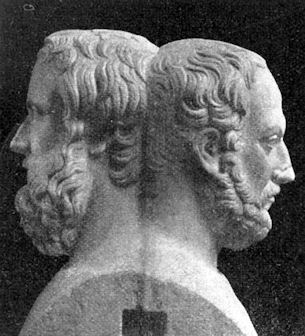
Herodotus and ThucydidesThe word history is based on Greek word for "inquiry," or "knowing by inquiry." Hecataeus of Miletus (550-489 B.C.) wrote early accounts of the myths: "account of what I considered to be true. For the stories of the Greeks are numerous and, in my opinion ridiculous." He also wrote about customs he observed on his travels. Euhemerus (300 B.C.) wrote Sacred History based on inscriptions he thought were written by Zeus himself on the island of Panchaea in the Indian Ocean. He said Gods were real people later deified.
One of the major things that distinguished historians from the myth makers that preceded them were the fact that they signed their names on their works, so that we know at least they were the sources. Only the works of three historians---Herodotus (484?-425? B.C.), Thucydides (471?-400? B.C.) and Xenophon---survived from the first 500 years of Greek history.
An ancient Greek version of Who's Who called Tables of Persons Eminent in Every Branch of Learning was prepared between 280 and 250 B.C. by Callimachus. It contained lists and brief biographies of well known lyric poets, writers, tragedians, comedians, orators, philosophers and doctors. "Under Thucydides the description read: "Thucydides was of Athenian birth, the son of Olorus. Slanderers claim his father was a Thracian who migrated to Athens. A very able writer, he composed a history of war between Athens and Sparta."
Herodotus
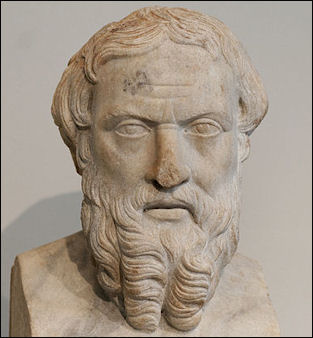
HerodotosHerodotus (484?-425? B.C.) has been called the Father of History, a compliment initially given to him Cicero. He is given credit for recording information from all over but criticized for using less than reliable sources and sometimes espousing what seems like propaganda. Most of Herodotus's histories were stories he picked up from travelers, merchants and priests. He seems to have known many were exaggerations or unproven claims and he made some effort to pick out what was plausible. Occasionally he ascribed events to myths. Aristotle called him a “legend monger." [Source: Daniel Mendelsohn, The New Yorker, April 28, 2008]
Daniel Mendelsohn wrote in The New Yorker, “Herodotus may not always give us the facts, but he unfailingly supplies something that is just as important in the study if what he calls ta genomena ex anthrupon or “things that result from human action”: he give us the truth about the way things tend to work as whole, in history, civics, personality, and, of course, psychology."
Herodotus was born in Halicarnassus, a town in Asia Minor that was home to one of the Seven Wonders of the World, the Mausoleum of Halicarnassus, which was finished decades after he left. Halicarnassus was also regarded as a major intellectual center for a time. Herodotus spent some time in Athens and was a friend of Sophocles. He traveled widely and wrote extensively about the places he visited and people and places he heard about. He visited Egypt, southern Italy, Mesopotamia, Persian, the Levent and the Black Sea area. He wrote about the Scythians based on things he heard and pieced together the Persian Wars from oral traditions and things he observed. [Source: "The Discoverers" by Daniel Boorstin,"]
Book: Herodotus by James Romm is a “lively short study." The Way of Herodotus by Justin Marozzi (De Capo 2009) is an excellent travelog and encounter with Herodotus. The Landmark Herodotus edited by Robert B. Strassler (Pantheon, 2008) is richly illustrated and filled with accounts by experts on everything from designs of ships to ancient measurements but the translation leaves much to be desired. The 1858 translation of Histories by George Rawlinson (Everyman Library) captures the “rich Homeric flavor and dense syntax” according to The New Yorker. The 1998 translation of Robin Waterfield (Oxford World Classic) is not bad.
Herodotus's History
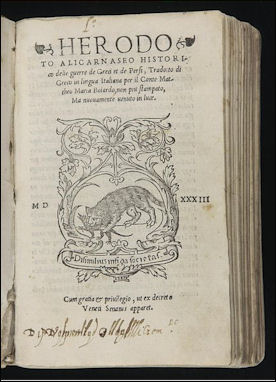
Herodotus's
History of the Persian Wars (1502)Herodotus wrote Histories , a nine-volume account of Persian wars between 490 to 479 B.C. Sometimes called The Persian Wars or History , the work contains frequent and lengthy digressions and seems to leave no detail unturned. Herodotus's style was lucid but poetic. Some regard him as the first master of prose. Cicero asked “what was sweeter than Herodotus." A 20th century translator said, “Herodotus's prose has the flexibility, ease and grace of a man superbly talking."
Herodotus called his book Historie . In his time the word meant “research” or “inquiry” and has come to mean “history” in our sense of the world because of him. The book was so full of details and curious facts it is sometimes considered the first tourist guides and in fact was still the standard travel guide in the 19th century.
Herodotus observed a variety of local customs and concluded that men were servants to customs to which they were born. He noted that when Darius offered to pay his Greek subjects to eat the bodies of their fathers instead of burning them as was their custom, they refused no matter how much was offered them. He then offered to give money to Indians, who customarily ate the bodies of their deceased fathers, if they would burn their bodies. They also refused no matter how much was offered them. On the Egyptians he reported "In any home where a cat dies" the residents "shave off their eyebrows" and “sons never take care of their parents if they don't want to, but daughters must whether they like it or not." He also noted “Women urinate standing up, men sitting down."
His accounts of the natural world are no less entertaining. In the case of vipers and snakes he said the male is killed by the female during copulation but the male is “avenged” by their young who kill the female. In Book 3 he describes how Indian gold is produced by a species of ants—“huge ants, smaller than dogs but larger than foxes."
Accounts from Herodotus's History
The Persian Wars take up about a third of History ---from the middle of Book 5 to the end of Book 9. The first four and half books proceed at a leisurely pace, with a lot of digressions, explaining the rise of the Persian Empire and tells readers everything they would ever want to know about Persia. See Persians Wars, History
Herodotus devoted nearly all of Book 2 of History to describing the achievements and the curiosities of the Egyptians. In Book 3 he describes the Persians encounter with the Ethiopians, which he describes as the tallest and most beautiful people in the world;. In Book 4 he describes the Scythians, ancient Mongol-like Horsemen that lived at the same time as the Greeks, and their maddening tactic and packing up their camps and leaving before they are attacked.
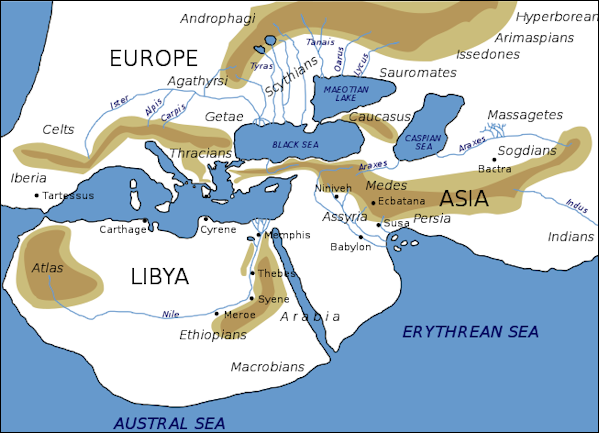
Herodotus world map
Herodotus wrote extensively about the Scythians. He described them as savage warriors who committed many atrocities. Some think that Herodotus gave the Scythians an unjustified, prejudiced bad rap and in all probability they committed no more atrocities than the Romans, Persians, Egyptians or even the Greeks themselves. It is not clear how much was based on first hand observation or second hand accounts but the latter seems most likely. It is also not clear how extensively Herodotus traveled in the Black Sea-Dnieper River heartland of the Scythians On one journey around 450 B.C. he probably reached Olbia, 40 miles west of the Dnieper River.
Herodotus begins Histories with his account if Croesus and calls him “the first barbarian known who subjugated and demanded tribute from Hellenes." The tale offers an introduction to a theme that would pervade the nine volumes of Histories ---don't overstep your bounds. Blinded by his success Croesus arrogantly misinterpreted a pronouncement by the Oracle of Delphi: “If you attack Persia you will destroy a great empire." Croesus thought the oracle was referring to the Persians but she was in fact referring to his own. Sardis was sacked by the Persians. According to Herodotus, Croesus asked Cyrus, “What is it that all these men of yours are so intent upon doing." Cyrus replied: “They are plundering your city and carrying off your treasures." Croesus then corrected him: “Not my city or my treasures. Nothing there any longer belongs to me. It is you they are robbing."
Thucydides
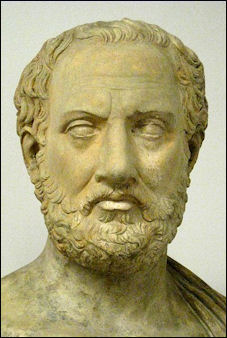
ThucydidesThucydides (471?-400? B.C.) wrote extensively about events in Greece and told the story of the draining, disastrous 30-year Peloponnesian War that destroyed Athens when it was in its prime in History of the Peloponnesian War . Little known about his life other than that he was an soldier and an officer. One of the few times he talks about himself is when he mentions he survived the plague. [Source: Daniel Mendelsohn, The New Yorker, January 12, 2004]
Tracy Lee Simmons wrote in the Washington Post: “One of the most eminently, and now, predictably, quotable figures of the classical world, Thucydides assuredly deserves his press. Few so well understood the machinations of he human heart and mind when facing the extremities of the human predicament---plague, betrayal, defeat, and the abject humiliation of war---and fewer still could distill the hard-won wisdom of experience into tight, shimmering phrases and radiant lapidary passages."
Thucydides was a participant in the events he described. He caught the plague he detailed with such precision. He was also far from a distant observer of the Peloponnesian War: he was a general high in the Athenian command early in the war who was forced into exile after he failed to prevent the Spartans from capturing the northern city of Amphipolis in 422. He wrote his account years later in part to defend his actions and in the end puts the blame on the demise of Athens on democracy and its demagogue politicians while arguing it was enlightened military that almost saved the day.
Book: Thucydides, The Reinvention of History by Donald Kagan (Viking, 2009). Kagan is a professor of classics and history at Yale.
Thucydides as a Historian
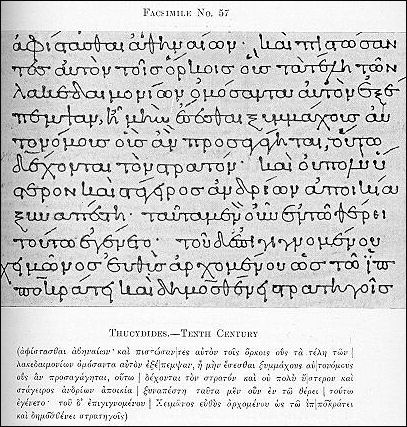
Thucydides manuscriptThucydides is regarded as a much better historian than Herodotus, who tended to romanticize and exaggerate. Thucydides named his sources and included documents to back up his claims. His style was terse and skeptical. And his emphasis on getting his facts straight makes him such a rich source of moral guidance and historical wisdom. It was Thucydides after all who first summed up the pattern of history when he said disasters “have occurred and always will occur as long as he nature of mankind remains the same."
Thucydides wrote: “With reference to the narrative of events, far from permitting myself to derive it from the first sources that came to hand, I did not even trust my impressions." He made sure he tested the accuracy of his reports “by the most severe and detailed tests possible” and found this required “some labor from the want of coincidence between accounts of different eye-witnesses."
Thucydides added that “the absence of romance from my history will...detract somewhat from its interest." However---if it be judged useful by those inquirers who desire exact knowledge of the past as an aid to the interpretation of the future, which in the course of human events must resemble if not reflect it."
But to achieve his goal of eschewing “literary charm” and myth, he made up dialogues and speeches---that no one really heard---to get at what the participants must have been thinking at the time. He wrote “My method has been to make the speakers say what in my opinion, was called for by each situation.":
Thucydides's History of the Peloponnesian War is the only extant eyewitness account of the first twenty years of the war. He said he began taking notes “at the very outbreak” of the conflict because he had hunch it would be---a great war and more worthy writing about than any of those which had taken place in the past." His accounts end in mid sentence during the description of a naval battle in 411 but we can tell from other references in his work that he was around to see the war end in 404 B.C.
Image Sources: Wikimedia Commons, The Louvre, The British Museum
Text Sources: New York Times, Washington Post, Los Angeles Times, Times of London, Yomiuri Shimbun, The Guardian, National Geographic, The New Yorker, Time, Newsweek, Reuters, AP, Lonely Planet Guides, Compton's Encyclopedia and various books and other publications. Most of the information about Greco-Roman science, geography, medicine, time, sculpture and drama was taken from "The Discoverers" [∞] and "The Creators" [μ]" by Daniel Boorstin. Most of the information about Greek everyday life was taken from a book entitled "Greek and Roman Life" by Ian Jenkins from the British Museum [||].
No comments:
Post a Comment